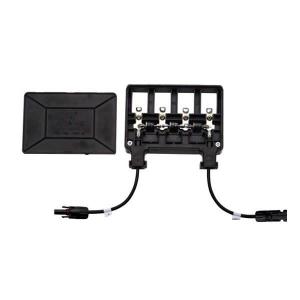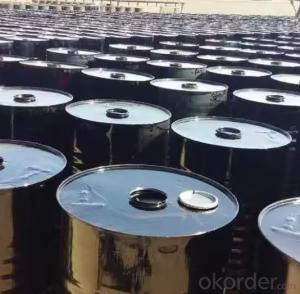Solar Junction box PV-JB002 ST01
- Loading Port:
- China Main Port
- Payment Terms:
- TT OR LC
- Min Order Qty:
- -
- Supply Capability:
- 10000 set/month
OKorder Service Pledge
OKorder Financial Service
You Might Also Like
Solar Junction box ,Due to highly robustness,UV-resistance,the touch protection a high grade connection is guaranteed for many
Solar Junction box ,Due to highly robustness,UV-resistance,the touch protection a high grade connection is guaranteed for many years
Rated voltage 1000 V
Rated current 16A
Contact resistance ≤5mΩ
Dia of pin or socket 3mm /4mm
Protection degree(mated,junction box closed/unmated) IP65/IP2X
Operating temperature -40 C to +85C
Insulation material PPO
Contact material Copper,silver plated
The junction box's inner shoulder be filled with glue under working
- Q:Can solar energy systems be used in powering beauty salons or spas?
- Yes, solar energy systems can certainly be used to power beauty salons or spas. Solar panels can be installed on the roofs or other available spaces of these establishments to generate electricity from sunlight. This renewable energy source can then be used to power various equipment, lighting, heating, and cooling systems within the salon or spa. By utilizing solar energy, these businesses can reduce their reliance on the grid, lower their energy costs, and contribute to a more sustainable and environmentally-friendly operation.
- Q:What are the different financing options for solar energy systems?
- There are several financing options available for solar energy systems, including cash purchases, solar loans, solar leases, power purchase agreements (PPAs), and property assessed clean energy (PACE) financing. Cash purchases involve paying the full cost of the system upfront. Solar loans allow homeowners to borrow money to finance the system and pay it back over time with interest. Solar leases involve leasing the system from a third-party provider and paying a fixed monthly fee. PPAs allow homeowners to purchase the electricity generated by the system at a predetermined rate. PACE financing allows homeowners to finance the system through an additional assessment on their property taxes.
- Q:What is the role of solar energy systems in reducing greenhouse gas emissions?
- Solar energy systems play a crucial role in reducing greenhouse gas emissions by harnessing the power of the sun to generate electricity without releasing any harmful pollutants or greenhouse gases into the environment. These systems provide a clean and renewable alternative to fossil fuel-based energy sources, such as coal or natural gas, which are major contributors to greenhouse gas emissions. By utilizing solar energy, we can significantly decrease our reliance on fossil fuels and mitigate the impact of climate change by reducing carbon dioxide and other greenhouse gas emissions.
- Q:Can solar energy systems be used for powering off-grid wildlife monitoring stations?
- Yes, solar energy systems can be used to power off-grid wildlife monitoring stations. Solar panels can generate electricity from sunlight, which can then be stored in batteries for use during periods of low or no sunlight. This makes solar energy a reliable and sustainable option for powering remote wildlife monitoring stations that are not connected to the electrical grid.
- Q:What is the role of energy management systems in a solar energy system?
- The role of energy management systems in a solar energy system is to optimize and control the flow of energy from the solar panels to various components of the system. These systems monitor and manage the production, storage, and usage of energy, ensuring that the solar energy generated is efficiently utilized and stored for later use. Energy management systems also enable monitoring and analysis of energy consumption patterns, allowing for better decision-making and resource allocation. Overall, these systems play a crucial role in maximizing the performance and effectiveness of a solar energy system.
- Q:Can a solar energy system be used in areas prone to hurricanes or tornadoes?
- Yes, a solar energy system can be used in areas prone to hurricanes or tornadoes. While it is true that these natural disasters can cause damage to solar panels and other components of the system, proper planning and installation can mitigate the risks. One key consideration is the design and structural integrity of the solar panels themselves. High-quality solar panels are built to withstand strong winds and extreme weather conditions. They are usually tested and certified to meet specific standards, including wind resistance ratings. In areas prone to hurricanes or tornadoes, it is important to install solar panels that are specifically designed to withstand the potential wind speeds and impacts associated with these events. Additionally, proper installation techniques can enhance the resilience of a solar energy system. For example, using reinforced mounting structures, securing panels with additional brackets or fasteners, and ensuring secure connections between panels, inverters, and batteries can help prevent damage caused by strong winds or flying debris. In some cases, homeowners may also choose to invest in solar panel tracking systems that allow the panels to automatically adjust their position to reduce wind resistance during extreme weather events. This feature can help protect the panels and increase their chances of surviving a hurricane or tornado with minimal damage. Furthermore, it is essential to have a backup power storage system in place, such as batteries, to ensure continuous power supply during and after a severe weather event. This backup system can store excess energy generated by the solar panels, allowing the system to operate independently of the grid during power outages caused by hurricanes or tornadoes. Overall, while there are risks associated with using a solar energy system in areas prone to hurricanes or tornadoes, careful planning, proper installation, and the use of resilient components can make it possible to harness solar power even in these challenging environments.
- Q:How much maintenance does a solar energy system require?
- A solar energy system requires very little maintenance. Routine inspections and cleaning of solar panels may be necessary, but overall, they have a long lifespan and require minimal upkeep.
- Q:What is the impact of solar energy systems on air quality?
- Solar energy systems have a positive impact on air quality. Unlike traditional sources of energy such as coal or natural gas, solar energy does not produce harmful emissions or pollutants during its operation. This means that solar power generation does not contribute to the release of greenhouse gases, particulate matter, sulfur dioxide, nitrogen oxide, or any other air pollutants associated with fossil fuel combustion. By using solar energy systems, we can significantly reduce our reliance on fossil fuels and, consequently, decrease air pollution levels. This has numerous benefits for both human health and the environment. Improved air quality can lead to a decrease in respiratory and cardiovascular diseases, as well as a reduction in respiratory symptoms and allergies. Additionally, solar energy systems contribute to the overall reduction in smog, acid rain, and global warming potential. Furthermore, the installation and use of solar energy systems do not produce noise pollution, another significant benefit compared to traditional energy sources. This reduction in noise pollution has positive impacts on the well-being and overall quality of life for individuals residing near solar installations. Overall, the adoption of solar energy systems is a crucial step towards improving air quality and mitigating the negative impacts of climate change. By harnessing the power of the sun, we can significantly reduce air pollution, promote cleaner and healthier environments, and create a more sustainable future for generations to come.
- Q:How do solar energy systems impact the electric grid?
- Solar energy systems impact the electric grid by providing a clean and renewable source of energy that helps reduce the overall demand for electricity from traditional power plants. By generating electricity locally, solar energy systems can help decentralize the grid and improve its reliability. However, the intermittent nature of solar power can pose challenges to grid stability and require additional measures to balance supply and demand effectively.
- Q:Can solar energy systems be used in areas with limited access to solar energy publications and resources?
- Yes, solar energy systems can be used in areas with limited access to solar energy publications and resources. While access to information and resources can be helpful, it is not a prerequisite for utilizing solar energy systems. Basic knowledge and understanding of the technology, combined with technical expertise, can enable the installation and maintenance of solar energy systems. Additionally, local communities can seek support from experts, organizations, or government agencies to bridge the knowledge gap and ensure successful implementation of solar energy systems in such areas.
1. Manufacturer Overview |
|
|---|---|
| Location | |
| Year Established | |
| Annual Output Value | |
| Main Markets | |
| Company Certifications | |
2. Manufacturer Certificates |
|
|---|---|
| a) Certification Name | |
| Range | |
| Reference | |
| Validity Period | |
3. Manufacturer Capability |
|
|---|---|
| a)Trade Capacity | |
| Nearest Port | |
| Export Percentage | |
| No.of Employees in Trade Department | |
| Language Spoken: | |
| b)Factory Information | |
| Factory Size: | |
| No. of Production Lines | |
| Contract Manufacturing | |
| Product Price Range | |
Send your message to us
Solar Junction box PV-JB002 ST01
- Loading Port:
- China Main Port
- Payment Terms:
- TT OR LC
- Min Order Qty:
- -
- Supply Capability:
- 10000 set/month
OKorder Service Pledge
OKorder Financial Service
Similar products
New products
Hot products
Related keywords



























